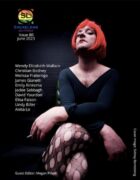To start, I am in awe of how this piece is organized as a single sentence of complexity, rhythm, and emotion. Every line and word carries weight in this piece, and then there’s a brilliance of the title–the list, the commas–reflecting the structure of the story. Can you describe your inspiration for this structure?
Thanks for your kind words! I’m writing a collection of stories with this structure of paragraph-long sentences, and my intent was to lend the story’s individual moments a sense of insufficiency—it wouldn’t be fair to punctuate frequently because none of the speaker’s interactions with these men or their own body “do the job,” or carry any finality. It’s all just moments, part of a greater, unsatisfiable urgency that keeps going and going, like some manic odyssey of desire. I wanted the form to resonate with that, to echo that sense of unresolvable tension.
One of my favorite aspects of this piece is the journey through the sensory: the clamping of feet, to head banging, and then shifting to the narrator’s gender-affirming surgery, where pain is at the forefront, yet instances are often marked by sounds—wailing, questions asked softly, the mother cooking—and at the end the narrator listens to “hear a meaningful sound.” Can you talk more about this choice? And how does the sensory play into your overall work?
The sensory is huge—I’m sure any writer operating from a place of personal pain can relate to the impulse to blot out the physical and scream about their feelings in the abstract, me included, but it’s sensations that give emotions somewhere to go. It’s important to me that the speaker’s interactions with their loved ones or lovers are not subsumed by pain—even if all these romantic trysts are doomed, and even if the examinations of her own body feel futile, I want the speaker to have been there, feeling what it sounded or looked like, hoping these experiences might end up pleasurable or even just palpable. I think it’s the pleasure of the body that lends loss and longing their impact.
I love the part where the line “I got a text from him saying How are you healing up and I replied I’m getting there” is repeated three times. What do you enjoy about using repetition in storytelling, especially how it’s utilized in flash fiction?
Repetition is hugely useful in storytelling for its ability to communicate varied ideas with identical words — I think that’s magical. I love the moment when a refrain takes on new meaning with each beat—the second repetition to realize something’s recurring at all, and the third to realize you’re sick of it. I get bored easily and am always trying to surprise myself, especially with flash, where you have a limited economy of words to tell your entire story. You don’t want to waste a line rehashing what’s already known. But I think everything is repetition anyway, variations on larger themes, or the same feelings in different shapes. So you sort of embrace it, I’d hope, maybe even exaggerate it.
As the story ends with a poignant note on love, I’d like to end on love as well. Can you talk more about exploring love in this story, as well as what you enjoy most about seeing love portrayed, in all its facets, in flash fiction?
Honestly, I think I could write and read about love forever. It’s the thing that lends everything else its credibility, its interest, its magic. I’m sure for other people it’s power or peace or something, and I’m sure it doesn’t matter—the crux of it is, are you writing about your favorite thing, the thing you’d die without. In this piece I wanted to explore the strangeness of love while dating as a trans woman: trying to be wanted despite a cultural disadvantage, the way someone can look at you and see nothing. Obviously love has everything to do with how we see our own bodies, how we modify and present them. I would hope my speaker feels the agony of desiring someone at the same time as the very real and staggering possibility of being desired back. That’s what I’d like to get across.



 The core workshop of SmokeLong Fitness is all in writing, so you can take part from anywhere at anytime. We are excited about creating a supportive, consistent and structured environment for flash writers to work on their craft in a community. We are thrilled and proud to say that our workshop participants have won, placed, or been listed in every major flash competition. Community works.
The core workshop of SmokeLong Fitness is all in writing, so you can take part from anywhere at anytime. We are excited about creating a supportive, consistent and structured environment for flash writers to work on their craft in a community. We are thrilled and proud to say that our workshop participants have won, placed, or been listed in every major flash competition. Community works.